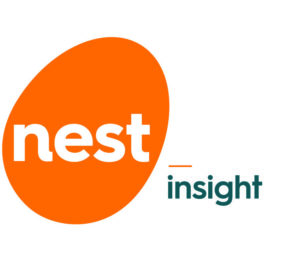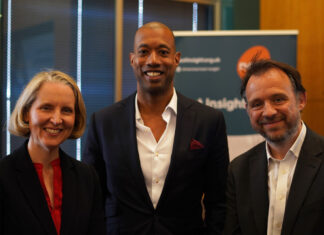Read the report: Workplace sidecar saving in action (PDF)
Finding shows that participating households had £384 median emergency savings balance at 12 months. A small but growing proportion of savers reach the pension rollover and their median monthly additional pension contribution via Jars was £100.
Nest Insight, a public-benefit research and innovation centre, has today published the concluding findings from its sidecar savings trial. During the four-year pilot, supported by the BlackRock Foundation, the Money and Pensions Service (MaPS) and JPMorgan Chase, Nest Insight has been working with UK employers to test the impact of a hybrid savings tool designed to help employees build up emergency savings and, once a savings target has been reached, to then put more aside for retirement on top of their normal auto enrolment pension contributions. Savings are made via payroll each pay period to help employees create a persistent savings habit.
Since the very first pounds were saved by employees at Timpson in July 2019, followed by workplaces BT, ITV, StepChange and the University of Glasgow, the savings tool known as ‘Jars’ has been offered to over 80,000 employees across the UK through Salary Finance and the Yorkshire Building Society. By trialling the savings tool in a variety of workplaces and over multiple years, Nest Insight has been able to see how workers engaged, saved and accessed savings in different settings and over time – across a period that included a global pandemic and a significant rise in the cost of living.
The sidecar savings idea works in the real world
The research trial found that the idea of sidecar savings has a high appeal among employees, particularly those with lower financial security. Employees who signed up have built a new savings habit and a growing proportion of these savers have seen their payroll saving amount roll over into a potentially meaningful extra contribution to their workplace pension.
- 46% of surveyed employees eligible for Jars say they think the savings tool would help them.[1]
- £384 median emergency savings balance at 12 months
- 99% of Jars accounts still active after 18 months
- 75% of Jars users making a payroll contribution at 18 months
- 6 in 10 Jars users made at least one withdrawal in the first year of having a Jars account
- 4% of Jars users are making additional pension contributions via Jars after 18 months.[2]
- £100 median monthly additional pension contribution made via Jars.
- Employees say that saving with Jars gives them greater peace of mind and confidence with money.
Together with academics Sarah Holmes Berk, John Beshears, David Laibson and Jay Garg from Harvard University, James Choi from Yale University, Brigitte Madrian from Brigham Young University, as well as researchers from MaPS, the research team has analysed over 60,000 data points and more than 72,000 survey responses.
[1] Note: not all employees need support with saving. Just over half of employees eligible for Jars were already saving every or most months.
[2] This compares to around 1.5% of the Nest membership as of 31 March 2022 who have ever made an additional direct pension contribution.
Jo Phillips, Research and Innovation Director at Nest Insight, comments:
“We knew that the sidecar savings model held promise as a financial resilience tool. But could it be built and implemented? How would employers and employees respond to the idea? How would people use it in reality? And what impacts would it have on financial wellbeing? We’re proud that our innovative sidecar savings trial has provided answers to these important questions. We now know that the sidecar savings model has the potential to address two of the biggest financial challenges for low to moderate income households in the UK – not having a buffer to cope with a financial shock today, and not saving enough to achieve a liveable, dignified retirement income in later life. But for sidecar savings, or workplace savings more broadly, to achieve that potential, we have also learned from this pilot that employees need more support to get started with saving, and that’s what we’re working on now in our trials of opt-out approaches, in which we are seeing hugely promising early results”
A savings tool that is flexible to different needs
- Budgeting and cashflow management: Money is kept aside for ongoing ad hoc expenses such as bills, fuel and shopping. Frequent withdrawals of smaller amounts are made. The account balance cycles up and down but overall stays quite flat over time.
- Building emergency savings: Savings are earmarked as a financial buffer to protect against unexpected expenses or income shocks, such as a car or appliance repair, or working fewer hours. The balance builds steadily over time unless a financial shock happens.
- Working towards a near-term saving goal: Savers build a fund towards known future events which could be shorter- or longer-term, such as Christmas, holidays or a home deposit. Money is usually not withdrawn until the goal is met, so the balance builds over time until one big withdrawal, possibly to zero, before saving for a new goal begins.
Each of these different use cases can help savers on a progression towards greater financial wellbeing. Savers were found to move between or use a combination of these approaches, depending on their current financial context and resilience.
UK workplaces have an important role to play
The research suggests that employers have a powerful potential role to play in supporting saving, particularly amongst those who have lower financial confidence and literacy. Throughout the trial, the research consistently found that a key barrier to starting a savings habit is that people can find it overwhelming and complex to choose a savings provider and product themselves. There are also high levels of mistrust and scepticism about financial services, particularly amongst those who are not already saving. These barriers can however be reduced if there is a good savings solution put in place by people’s employers. Most employees place trust in their employer’s ability to conduct due diligence in their workers’ best interests, and the fact that there is a default savings provider in place means that the cognitive load of choosing a provider is removed.
Employers participating in the trial found that Jars was no more complicated to set up than other new benefits. One participating employer said: “Jars was very easy to set up, as all the technology and most of the administration is provided by Salary Finance. No special training was needed. Payroll staff just need to process the file provided by Salary Finance each month and make the necessary payment.”
An opt-out approach supports more employees to get started with saving
Although the sidecar savings tool is appealing, and appears easy and straightforward to employees, encouraging take-up of payroll savings tools is a significant challenge. Many people want to save but they simply don’t get around to it. Psychological, contextual and situational barriers can get in the way of converting their intention into action. Nest Insight consequently began to think about how to build on learnings from the sidecar saving trial and boost participation amongst those who need and want to save, without restricting an individual’s right to choose what to do with their money. Nest Insight is currently trialling an opt-out sign-up approach, similar to pensions auto enrolment, with SUEZ and their credit union TransaveUK, as well as Wagestream and two of their employer clients. Early results from the SUEZ trial have already been shared and further results from both trials will be published in late spring 2023.
Jo Phillips, continues:
“The sidecar savings trial has greatly enriched our understanding of the real-world lived experience of saving – the difficulties that people face in getting started and continuing with saving, and the different ways in which people build and use their savings. We hope that the significant new evidence and insights on the benefits of hybrid savings solutions will help guide industry and policymakers as they consider how to adopt, design and evolve the sidecar savings concept for the real world.”
Caroline Siarkiewicz, Chief Executive of the Money and Pensions Service, said:
“As a co-funder of sidecar savings, I am delighted with the promising results of initiatives like Jars, which are important in providing a new route for working with employers on helping people save. One in four UK adults don’t have £100 in savings. This means a huge proportion of the population do not have the financial resilience that could help them at a time when household budgets are under pressure.
“We will continue to champion the importance of savings schemes, especially autosave models, that make it easy for people to build up savings in a way that works for them.”
Gemma Gooch, Global Co-Head of Social Impact at BlackRock, said:
“Everyone should have access to a secure financial future. But thinking about and planning for the future is difficult for people facing near-term financial uncertainty, only compounded by the cost of living crisis.
“Understanding that building a short-term financial safety net was a precondition to long-term financial security, BlackRock committed $50 million early in 2019 to drive systems-level change and achieve tangible impact at scale in the US and UK. Nest Insight has been our key partner in the UK and are building a strong evidence base demonstrating the positive impact emergency savings can have on employee financial wellbeing.”
Hang Ho, Head of International Markets, Global Philanthropy, at JPMorgan Chase, said:
“An unexpected expense or emergency can have long-lasting effects on individuals and their families, especially those from low-income households. As the cost-of-living crisis places increasing stress on household budgets, saving for the unknown can feel challenging. Ensuring that people have access to the tools and resources they need is critical to helping them build their savings and improving resiliency and financial health in our communities.
“Nest Insight’s recent trial has demonstrated the impact that innovative solutions can have on helping people save for both short-term emergencies and long-term security, and we’re pleased to support them in their work.”
ENDS
Notes to editors
Further information about sidecar savings trial and the results can be found in Nest Insight’s research report: Workplace sidecar saving in action (PDF)
Information about Nest Insight’s opt-out payroll savings trials, also known as ‘autosave’ trials, can be found here: nestinsight.org.uk/opt-out-payroll-savings-trial/
How Jars works
In this trial, Nest Insight piloted a sidecar saving solution called Jars. It works like this:
- Sign up: If the employer offers Jars, employees can sign up to save via payroll.
- Choose settings: Employees choose how much they want to save from each pay packet and set a savings target. They can change these settings at any time.
- Open savings account: Employees open a new instant access savings account – this accessible savings ‘jar’ sits alongside their existing pension pot.
- Save every payday: Employees’ chosen amount is moved automatically from their salary each payday into their accessible savings jar.
- Auto rollover to pension saving: Once their savings target is reached, their contributions are sent to their workplace pension pot, on top of their normal pension contributions
- Use savings when needed: Employees can take money out of their accessible savings jar as often as they want. Whenever the balance drops below their savings target, their payroll savings start going back into their accessible saving Jar again to fill it back up.
Notes:
- Jars is provided by Salary Finance.
- The accessible savings accounts are provided by Yorkshire Building Society. Employees can quickly access these savings whenever they need to, without a penalty.
- Pension savings are made as additional voluntary contributions into the existing workplace pension scheme which is in place at the employer.
Jars users say
- “Having a Jars account really reassured me and knowing that if something was to happen, I had a little bit of money to take care of something. It put my mind at ease, and it was stress free.”
- “I felt it was a good way to save; with the money coming off regularly each month I was able to save without difficulty. It also allowed me to add to my pension pot once my target was reached.”
- “It’s peace of mind, you don’t worry as much if you have savings. I would rather save than build up debt, having sleepless nights owing thousands of pounds.”
- “I signed up with Jars to try and get better control of my money. I have poor spending habits and find that it is easier to save if the money is taken out of my salary before I receive it.”
- “I trusted my employer. I find it very hard to trust banks as I don’t know a lot about them, so it was good to go with my employer.”
- “One of things I’ve found with saving being quite difficult to and never quite being able to get there, this is the first time I’ve had the opportunity to save, which gives you quite a nice feeling of self-worth as you’re achieving something for once without it all disappearing out of sight.”
Impact beyond the trial
- The sidecar savings trial has contributed to the development and implementation of the MaPS’ Financial Wellbeing Strategy for the UK, and in particular to the ongoing work around the ‘Nation of Savers’ objective.
- The research has also contributed to the growing evidence base that, in part, led to the ground-breaking SECURE 2.0 Act. This paves the way for US employers to automatically enrol employees in emergency savings options associated with their workplace pension.
- There has been considerable policy and industry interest in the sidecar savings trial throughout its duration. Many have called for some kind of emergency savings provision to be included in any evolution of pensions auto enrolment policy. The ‘plumbing’ of the auto enrolment system in the UK has the potential to also address employee’s lack of short-term resilience. Learnings from this trial could provide valuable evidence to support the design of any such intervention.
About Nest Insight

Nest Insight is a public-benefit research and innovation centre. Our mission is to find ways to support people to be financially secure, both today and into retirement. We conduct rigorous, cutting-edge research, working collaboratively with industry and academic partners to understand the financial challenges facing low- and moderate-income households. We use these data-driven insights to identify and test practical, real-world solutions. Our findings are shared widely and freely so that people around the world can benefit from our work. For more information visit nestinsight.org.uk
About Nest Insight’s strategic partner
![]()
BlackRock is a global investment manager serving the UK market for more than 30 years with a purpose to help more and more people experience financial well-being. BlackRock’s Emergency Savings Initiative is made possible through philanthropic support from the BlackRock Foundation. The initiative brings together partner companies and non-profit financial health experts to make saving easier and more accessible for low- to moderate-income people across the US and UK, ultimately helping more people to establish an important financial safety net. For more information, visit: blackrock.com/corporate/about-us/social-impact
About our programme partners
Our strategic partner, BlackRock, provides support for our workplace emergency savings research as well as the wider Nest Insight programme.

The Money and Pensions Service (MaPS) vision is: ‘everyone making the most of their money and pensions’. MaPS is an arm’s-length body committed to providing access to the information and guidance people across the UK need to make effective financial decisions over their lifetimes. For more information, visit: maps.org.uk
![]()
JPMorgan Chase & Co. (NYSE: JPM) is a leading financial services firm based in the United States of America (“U.S.”), with operations worldwide. JPMorgan Chase had $3.7 trillion in assets and $303 billion in stockholders’ equity as of March 31, 2023. The Firm is a leader in investment banking, financial services for consumers and small businesses, commercial banking, financial transaction processing and asset management. Under the J.P. Morgan and Chase brands, the Firm serves millions of customers in the U.S., and many of the world’s most prominent corporate, institutional and government clients globally. Information about JPMorgan Chase & Co. is available at www.jpmorganchase.com.
About our delivery partners
![]()
Salary Finance’s mission is to help millions become financially healthier and happier. They do this by partnering with employers to provide a holistic suite of salary-linked employee financial wellbeing benefits. Their comprehensive, award-winning benefits offering currently reaches over 4 million employees within 550+ of the UK’s largest employers including Tesco, Royal Mail, BT, the NHS and 20% of the FTSE 100. For more information on Salary Finance’s solutions for helping employees to get out of debt, start saving, advance their pay, protect their future and learn better financial habits, visit salaryfinance.com
![]()
Yorkshire Building Society is a mutual organisation, owned by its members and customers. It’s driven by social purpose and here to serve its members. It’s proud of the difference it makes to people’s lives by helping them to achieve their goals. It’s here to create long-term member value, help people have a place to call home and support them towards greater financial wellbeing. It believes that helping people with these goals is how it can make the biggest contribution to society. For more information visit: ybs.co.uk







